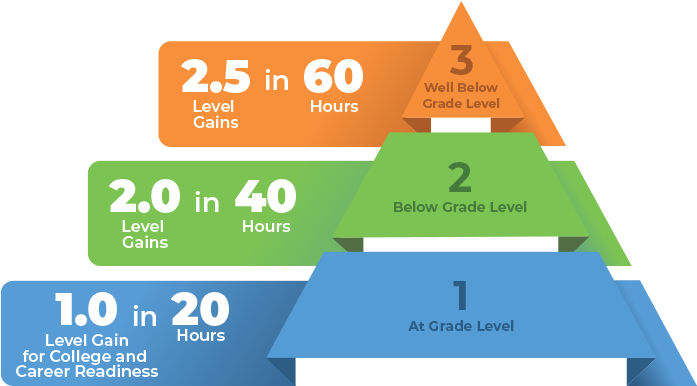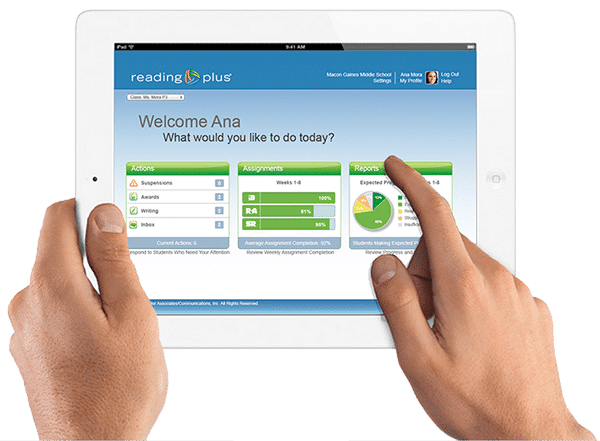Photo provided by Reading Plus.
Click… Click… Click… the sounds of my space bar echo throughout my bedroom. I groan with frustration as I glance to see how much progress I have made. Nearly finished. My eyes begin to water from staring at the lines on the screen. My mind slowly drifts away, pondering what I could be doing with this time instead. The Reading Plus selection finally wraps up and I give a sigh of relief. The nightmare is finally over… or so I thought. It dawns on me that I have questions to answer about what I just “read” in addition to reading another section. As evening approaches and the sky turns dark, the sound of my space bar continues… Click… Click… Click…
This is a common scene many high school students have experienced when using the program known as Reading Plus. An overwhelming number of students have had complaints about the program, ranging from the unusual reading frame which only depicts a few words at a time to the boring, uninteresting selections. Some teachers disapprove of its methods while others advocate for them. I believe that while Reading Plus does have some virtues, for a majority of excelling students, it is a massive waste of time. But let’s start from the beginning: what is Reading Plus?

Image provided by Reading Plus.
“Depending on how the student performs on the diagnostic, they will have a varied amount of selections per week along with a varied amount of questions per selection.”
According to their website, Reading Plus is “an adaptive literacy program that develops [the] fluency, comprehension, and motivation students need to be successful readers.” It consists of two different programs, each aimed at improving student’s literature. First is the reading section. Each student takes a diagnostic test to determine their baseline reading level. Depending on how the student performs on the diagnostic, they will have a varied amount of selections per week along with a varied amount of questions per selection. The assignment will begin with reading a story with a reading frame where only one line of text is shown at a given time. After finishing a selection, students must answer comprehension and analytical questions about the story. As the student progresses through the program they may increase their reading level from A to M; the completion of M means one has completed the program and achieved a college-level of reading. The second section is vocabulary which flashes words briefly and gives the student a multiple choice question for the right definition. The student is then required to read through answer options and pick two of the sentences which use the word correctly.
Despite being most known for its online programs using modern technology, Reading Plus originated in the 1930s. Its foundations were in researching and developing technologies to help students improve in reading. In 1985, the Visagraph 1 device was invented, the first system ever made to automatically measure reading ability using computer programming. The company’s online program was founded in 1995, and the program students use today launched in 2013. It is hard to deny the legitimacy of Reading Plus considering their extensive background in children’s reading and development.

Photo provided by Academic Edge.
Reading Plus has been in widespread use across the US for a legitimate reason. A study found that by the time they finish high school, today’s students read 19% slower than students 50 years ago. The study measured comprehension using eye-tracking technology along with reading rate, how long students spent on a word, and how fast the eyes moved from left to right. While today’s students and students from 50 years ago had mostly the same reading capacity in second grade, reading efficiency either stayed the same or flatlined for today’s kids, whereas it increased at a steady rate for students 50 years ago. Modern students read 45 fewer words per minute and had an increase of 17% in fixations. This could be an issue because although these students managed to pass 12 years of school with a below-average reading capacity, they will soon be entering the workforce where they may struggle to do their job.
Several analytical studies have shown the usefulness of Reading Plus and have proven its capability. One scientific study conducted by John Shelley-Tremblay, Ph.D., and Joshua Eyer, M.S, concluded that Reading Plus “produced significantly larger gains than randomly assigned controls in comprehension and word knowledge in normally achieving 2nd graders.” On their website, Reading Plus has several data maps each displaying the effectiveness of their program for a wide range of demographics. In addition, their website also has personal stories where students attest to the performance of the program. There is simply too much evidence supporting that Reading Plus does help in reading skills.
Reading Plus has been established to be a very effective program in a time where students’ reading skills are in desperate need of help. Its multiple studies and deep-rooted history in the improvement of student reading makes it hard to argue against the program. Despite this overwhelming evidence, what do students like myself believe? The general consensus amongst the high school community is that Reading Plus is busy work and does not help. The main complaint is that the selections do not align with their interests and it forces them to read at a pace they do not enjoy. One compelling argument is that the questions are poorly crafted and can be guessed without even reading the passage. Several students have also expressed their problems with the Reading Plus system in general. For example, some students have completed the program in previous years yet are forced to start from the beginning again when the new school year starts.
With all the evidence and history covered regarding this reading program, along with student and staff thoughts, let’s finally dig into my opinion on Reading Plus. It is hard to overlook the ample evidence supporting the program. The countless studies on Reading Plus and its methods have proven it to be undeniably helpful in developing student’s reading skills. However, the one massive oversight that the program has had is that not all students are the same. High-achieving students may find this program to be useless and boring as their comprehension skills are already meeting or above their grade level. Reading Plus should only be implemented for struggling students, not students meeting or exceeding the expectation, as, after all, the program was developed to aid students who were struggling in reading, not for those already succeeding. Many above average students already read on their own time, so the additional reading enforced by Reading Plus is unnecessary and unhelpful for them.

The guided window in Reading Plus.
Lastly, many students take issue with the system that Reading Plus uses. They dislike the guided reading window they are forced to read through, and find the questions and selections to be boring. Reading Plus was invented as a way to help students develop a motivation for reading and encourage them to read on their own, yet it is doing the exact opposite. Reading Plus takes the fun out of reading, which means no student is going to give their all if they don’t see it as fun or worthwhile. I think if a student finds it harder to read through Reading Plus’ system, they should be able to opt out, and instead be allowed to check out and read a book from the library. This would allow them to choose what kind of books they want to read and may also encourage them to read more on their own time. Despite school being all online right now, Washington’s school library is open online via ebooks or putting books on hold and picking them up in person. (You can find more on their website.)
At the end of the day, reading is an important part of our society and is necessary for our day-to-day lives. Student’s improvement in reading is integral for them to succeed in school and later on in life. Despite being proven to help struggling readers, for a majority of students it is a form of busy work that does not improve their already advanced reading skills. Students who have already proven themselves to be capable in reading should not be forced to participate in this program.
Isaac Yang is currently a junior at Washington High School who just joined the Hatchet. He grew up in Newark but moved to Fremont after fourth grade, where he met many great people who are his friends to this day. Isaac hopes to explore all aspects of journalism and cover topics of interest such as current events this year. Some of his hobbies are messing around with photoshop and occasionally doodling. When he is not being productive, Isaac likes to hang out with friends and play cards. After high school, he hopes to go to a decent college and work in the science field.


Isaac,
As a member of the Reading Plus team, I want to thank you for the thoughtful review of our platform. We value this type of direct insight from our users and have shared your article with members of our executive leadership team.
La’Keisha Ciprian
Reading Plus Community Manager